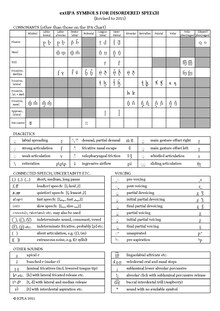
The Extensions to the International Phonetic Alphabet for Disordered Speech, commonly abbreviated extIPA /ɛkˈstaɪpə/,[1] are a set of letters and diacritics devised by the International Clinical Phonetics and Linguistics Association to augment the International Phonetic Alphabet for the phonetic transcription of disordered speech. Some of the symbols are used for transcribing features of normal speech in IPA transcription, and are accepted as such by the International Phonetic Association.[a]
Many sounds found only in disordered speech are indicated with diacritics, though an increasing number of dedicated letters are used as well. Special letters are included to transcribe the speech of people with lisps and cleft palates. The extIPA repeats several standard-IPA diacritics that are unfamiliar to most people but transcribe features that are common in disordered speech. These include preaspiration ⟨ʰ◌⟩, linguolabial ⟨◌̼⟩, laminal fricatives [s̻, z̻], and ⟨*⟩ for a sound (segment or feature) with no available symbol (letter or diacritic). The novel transcription ⟨ɹ̈⟩ is used for an English molar-r, as opposed to ⟨ɹ̺⟩ for an apical r; these articulations are indistinguishable in sound and so are rarely identified in non-disordered speech.
Sounds restricted to disordered speech include velopharyngeals, nasal fricatives (a.k.a. nareal fricatives) and some of the percussive consonants. Sounds sometimes found in the world's languages that do not have symbols in the basic IPA include denasals, the sublaminal percussive, palatal and velar lateral fricatives, and fricatives that are simultaneously lateral and sibilant.
ExtIPA was revised and expanded in 2015; the new symbols were added to Unicode in 2021.[2]
- ^ Ball 1993, pp. 39–41
- ^ Miller, Kirk; Ball, Martin J. (2020). "Unicode request for extIPA support" (PDF). Unicode. L2/20-039.
Cite error: There are <ref group=lower-alpha> tags or {{efn}} templates on this page, but the references will not show without a {{reflist|group=lower-alpha}} template or {{notelist}} template (see the help page).